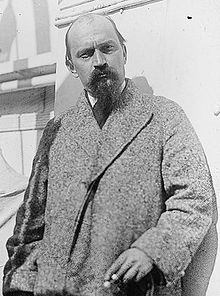Ivan Mestrovic
| Ivan Meštrović | |
|---|---|

Photographed in Zagreb in 1928.
|
|
| Born |
15 August 1883 Vrpolje, Kingdom of Croatia-Slavonia, Austria-Hungary (present-day Croatia) |
| Died | 16 January 1962 (aged 78) South Bend, Indiana, United States |
| Nationality | Croatian/American |
| Education | Split, Vienna, Paris |
| Known for | Sculpture, Architecture |
| Notable work |
Victor (monument) |
| Movement | Art Nouveau, Symbolism |
Victor (monument)
The Bowman and The Spearman
Gregory of Nin statue
Ivan Meštrović (Croatian: [ǐʋan mɛ̂ʃtrɔʋit͡ɕ]; 15 August 1883 – 16 January 1962) was a renowned Croatian sculptor and architect of the 20th century. After the end of World War II, he left Yugoslavia and emigrated to the United States.
He was born in Vrpolje, Slavonia, and spent his childhood in the small Dalmatian village of Otavice, the native place of his parents in the Dinaric Alps. His father was a poor peasant and sheep-breeder. At the age of sixteen he was accepted as an apprentice by a master of a stonemasonry in Split.
His artistic skills were improved by studying the monumental buildings in the city and his education at the hands of Bilinić's wife, who was a high-school teacher. Soon, they found a mine owner from Vienna who paid for Meštrović to move there and be admitted to the Academy of Fine Arts where he studies under Edmund von Hellmer and Otto Wagner. He had to quickly learn German from scratch and adjust to the new environment, but he persevered and successfully finished his studies.
In 1905 he made his first exhibit with the Secession Group in Vienna, noticeably influenced with the Art Nouveau style. His work quickly became popular, even with the likes of Auguste Rodin who once said that Meštrović is the greatest phenomenon among sculptors and even greater sculptor than he was. Because of that popularity he soon earned enough for him and his wife (since 1904), Ruža Klein, to travel to more international exhibitions.
...
Wikipedia
